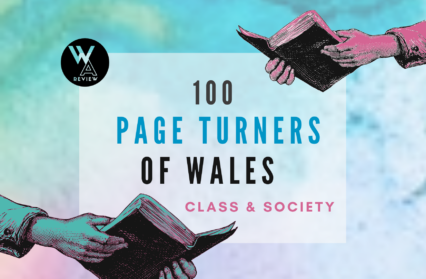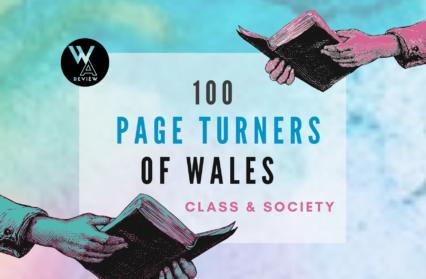Class and Society | Emma Schofield reflects on the books chosen by our judging panel in the ‘Class and Society’ category of our countdown of 100 Page Turners from Wales.
‘Every aspect of personal life is radically affected by the quality of general life, and yet the general life is seen at its most important in completely personal terms.’ The words of prolific Welsh writer and academic Raymond Williams resonate as we follow on from our Politics category with another list which also packs a powerful political punch, as well as offering a number of compelling reads. The stories told by the books in our Class and Society category all focus on the lives of the characters they feature, while simultaneously exploring the wider issues of class and society which directly affect those lives.
Perhaps the best place to start is with the earliest entry nominated by the judging panel in this category, Winter Sonata by Dorothy Edwards. In Edwards’ astute exploration of the personal impact of perceptions of class and society, a young telegraph Clark, Arnold Nettle, arrives in an English village and quickly becomes involved in a relationship with a local gentlewoman, Olivia. Edwards contrasts Olivia’s frustration with the way in which she finds herself confined by class boundaries and social expectations, with her portrayal of the working-class family who Arnold lives with while staying in the village. Throughout the novel, class and society are presented as boundaries which restrain and stereotype people and through which there is little hope of progression or escape.
Winter Sonata is closely followed on the list by Elizabeth Inglis-Jones’ 1929 novel Starved Fields. Inglis-Jones’ novel delves into the complex relationship between the families of two squires in Cardiganshire, unpicking problems created by an incompatible marriage and alcohol dependency, all set against the backdrop of a gradually decaying eighteenth century country mansion. The novel generated some scandal at the time of its publication, in part due to its depiction of male drunkenness and violence, but its exploration of society nevertheless makes for fascinating reading. A different set of social issues are explored by Lewis Jones in his 1937 novel Cwmardy, in which a local mining community face the impact of strikes and war on their lives, with young political enthusiast Len stepping forward to organise a response to the relentless blows dealt to his local community.
The more recently published entries on the list pack no less punch than their predecessors, reminding us that while times may have moved on, the topic of Class and Society is no less significant now than it was in Inglis-Jones’ time. Catrin Dafydd’s 2007 novel Random, Deaths and Custard slides gently between comedy and emotion in order to depict the life of Sam, a bilingual young woman who lives with her mum and nan in the South Wales valleys. Sam works in the custard factory in her town in which she asked to do some translation work one day, prompting her to reconnect with the Welsh language which she has not used since leaving school. In so doing, Sam is also able to forge a new kind of bond with her Welsh-speaking nan. What follows is a lively and contemporary portrait of the complexity of language, society and class status within South Wales in the twenty first century. Approaching the topic from a different angle, Niall Griffiths sets out to tackle the disenfranchisement of class within society in his 2000 novel, Grits. The novel centres on the lives of a group of young adults from across different parts of the UK who congregate in West Wales, all searching for purpose in different ways. Tracing the choices they each make when faced with drugs, sex and opportunistic crime, the narrative captures not only a sense of despair, but a lack of direction and a desperation to find purpose where there appears to be none.
The books in this category are marked by opposites: choice, or lack of choice; the personal, or the general; freedom, or restriction. They are a poignant reminder of how societal expectations can determine the course of our personal sense of identity and an apt example of why boundaries of class and society must always be tested and, where necessary, challenged.
Class and Society
Outside the House of Baal by Emyr Humphreys (1965)
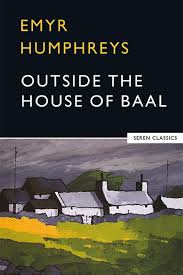
Synopsis: 1963. Over the course of a single morning, J.T. Miles looks back over seventy years of his lifetime. It has been a period of huge change everywhere, but especially in Wales. His country has changed from a rural, religious, Welsh-speaking society where heaven is achieved through living a ‘good life’, to a place like so many others, where technology is making ‘heaven on earth’ possible. A preacher, J.T. has tried to live a good life. He opposed the Great War and spoke out against much wrongdoing, as his Christian duty, when perhaps he should have shown more understanding. His confusion and sense of failure is compounded by the presence of his sister-in-law Kate, who shares his house and who at one time he might have married. Instead he had chosen Lydia, free-spirited and strong-willed. J.T. and Kate; the events of one morning confront those of two lives which are themselves confronting each other for the first time.
Review Quotes:
‘The greatest novel of anglophone Welsh literature.’ M. Wynn Thomas
‘In a phrase or two Emyr Humphreys’ people are solid and present. If novels are about the human heart then this is an impressively central one.’ The Sunday Telegraph
Resources:
British Literature Council: Emyr Humphreys
Sugar Hall by Tiffany Murray (2004)
Synopsis: Easter 1955. As Lilia Sugar scrapes the ice from the inside of the windows and the rust from the locks in Sugar Hall, she knows there are pasts she cannot erase. On the very edge of the English/Welsh border, the red gardens of Sugar Hall hold a secret, and as Britain prepares for its last hanging, Lilia and her children must confront a history that has been buried but not forgotten.
Review Quotes:
‘A mysterious, complex and riveting novel, poised between this world and the next.’ New Welsh Review
‘Sugar Hall is not just a brilliantly effective ghost story. It also pries open a window on to a vanished decade, exploring the long consequences of old sins and the suffering of the exile, the refugee and the powerless. Chillingly empathetic, it’s a book that cries out to be read again – and again.’ Andrew Taylor
Resources:
British Council, Literature: Tiffany Murray
Grits by Niall Griffiths (2000)
Synopsis: In the late 1990s, a group of young drifters from various parts of Britain find themselves washed up together in a small town on the west coast of Wales, fixed between mountains and sea. Here, they both explore and attempt to overcome those yearnings and addictions which have brought them to this place: promiscuity, drugs, alcohol, petty crime, the intense and angry search for the meaning which they feel life lacks at the arse-end of this momentous century. A novel about the dispossessed and disenfranchised, about people with no further to fall, Grits is also resolutely about the spirit of the individual, and each character’s story is told in their own rich, powerful dialect. Through their voices, the novel charts this chapter in their lives, presenting, with humour and rage and a deep underlying sadness, a picture of the diversity and waste that is life in Britain today.
Review Quotes:
‘An astonishing feat… pulsing on every page with the unmistakable brilliance, authenticity and spirit of a magnificently gifted writer.’ Irvine Welsh
‘Persuasive, alarming and addictive.’ The Times
Resources:
Cwmardy by Lewis Jones (1937)
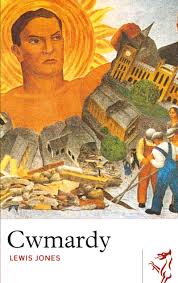
Synopsis: The first of Lewis Jones’ two epic industrial novels of the 1930s. Big Jim, collier and ex-Boer War soldier, and his partner Siân endure the impact of strikes, riots and war, while their son Len emerges as a sharp thinker and dynamic political organiser. Cwmardy paints a graphic portrait of the casual exploitation, tragedy and violence as well as the political hope and humanity of South Wales industrial workers from the 1900s to the 1930s.
Review Quotes:
‘Cwmardy is nothing if not sensational… In Jones’s blockbuster (the first of two vivid works showing the vibrant, testing lives of people in the coal mining communities around and during the General Strike of 1926) there is hardly a page without something happening, which makes it a page turner comparable to any airport thriller.’ Jon Gower
Resources:
National Library Wales, Digital Exhibition: Cwmardy
Wales Arts Review: Greatest Welsh Novel
A Small Country by Sian James (1979)
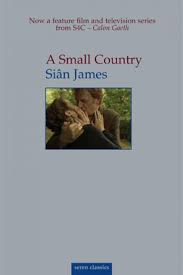
Synopsis: A Small Country is the story of the Evans family, farmers in Carmarthenshire. In the summer of 1914 son Tom returns from Oxford to find the family falling apart. His handsome father has gone to live with schoolmistress Miriam Lewis, who is to have his child. His mother, broken-hearted, lies ill in bed, while his beautiful sister Catrin longs to leave for London and art college. Soon Tom’s college friend Edward will arrive to holiday with them, half-aware of his attraction to Catrin but already engaged to Rose, a supporter of the Suffragettes. And Tom himself is in debt and disillusioned with his proposed legal career. He would like to manage Hendre Ddu, the family farm, but finds that family troubles and the approach of war set him on a very different course.
Review Quotes:
‘A memorable and abundantly rewarding read.’ Jesse Larsen
Resources:
Winter Sonata by Dorothy Edwards (1928)
Synopsis: Arnold Nettle, a shy young telegraph clerk, arrives in an English village as summer fades, hoping that a season in the country will aid his frail disposition. Repulsed by the behaviour of his working-class landlady and her brood, especially the bold and flirtatious Pauline, Nettle becomes enamoured with Olivia Neran and her respectable middle-class family. But even this privileged home is not free from difficulty; Olivia is being suffocated by her role as a gentlewoman, while her sister Eleanor is confronted with the gender inequality that dominates her society.
Review Quotes:
‘An ambitious novel.’ The Times
Resources:
Dictionary of Welsh Biography: Dorothy Edwards
This Bygone by Ron Berry (1996)
Synopsis: For Dewi Joshua, collier’s boy, life underground at Pencaer colliery is central to his whole being. When he and other men from the Four Deep are laid off, he feels sickened, disintegrated: More than anything he missed the togetherness of men underground, the bonding, walking the main, old blokes on the double-parting discussing Moel Exchange events and all the wireless and newspaper world like gods talking. Sanguine commentaries between hewing coal far, far away from all sky. Butties and mates settling down for grub at 11 o’clock, blokes queuing to the lamp room, collier-boys, chin-wagging outside the pay hatch on Fridays.
Critic Quotes:
‘Fine as a documentary record This Bygone is, it is even more memorable as a stylistic achievement, elaborately artificial, as all fiction must be.’ John Pikoulis, writing in Fight and Flight: Essays on Ron Berry, ed. Burdett and Morse
Resources:
Ron Berry – Obituary: The Independent
The Colour of a Dog Running Away by Richard Gwyn (2005)
Synopsis: Lucas, a musician and translator, comes home one day to find a cryptic postcard on his doorstep. This postcard sets in motion a series of bizarre, seemingly interconnected events, leading Lucas and his girlfriend, Nuria, to be kidnapped by a religious cult with roots stretching back to the thirteenth century. Seeking guidance from a fire-eater, a band of mythic roof-dwellers, and his deeply sceptical friends, Lucas must figure out who to believe-or who can believe him.
Review Quotes:
‘Evoke[s] the exhilarating unpredictability of urban life. . . . Gwyn’s plot is humming.’ The Washington Post
‘The best novel of the year.’ The Bookseller
Resources:
Penguin Random House Reader’s Guide to The Colour of a Dog Running Away
Wales Literature Exchange: The Colour of a Dog Running Away
Random Deaths and Custard by Catrin Dafydd (2007)
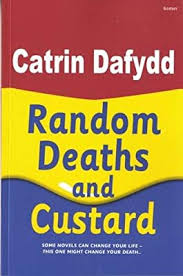
Synopsis: Sam Jones is a perfectly ordinary Valleys girl. Except for the random deaths, that is. Which she only just manages to avoid. Like the time she swallows a fish finger whole before answering the door to the catalogue salesman. That random death leads to love, mind, which is a relief to Sam: people on her street will stop thinking she’s a lesbian. She has plenty of other crosses to bear: the custard factory where she works; Nanna’s farting and Anti Peg’s swearing; her Mam’s boyfriend; her squaddie brother. Not to mention the posh Welshies at the end of the road.
Review Quotes:
‘The intersection of language and class divisions is cleverly set out.’ Maggie Robertson, gwales
‘A delightful novel that bridges cultures and that will make you chuckle – and splutter – into your favourite dessert.’ Wales Online
Resources:
Gomer – Author Page, Catrin Dafydd
Starved Fields by Elisabeth Inglis-Jones (1929)
Synopsis: Elisabeth Inglis-Jones was born in London, but grew up at Derry Ormond, near Lampeter, an estate her family had owned since 1783. She published her first novel Starved Fields in 1929, which caused something of a scandal because its picture of Cardiganshire life showed the men, at least, as drunken brutes. The novel delves into the complex relationship between the families of two squires in Cardiganshire, unpicking problems created by an incompatible marriage and alcohol dependency, all set against the backdrop of a gradually decaying eighteenth century country mansion.
Resources:
Letter from Aberystwyth: Blog Post on Elisabeth Inglis-Jones
Class and Society is part of a larger series highlighting Wales’ rich literary tradition, you can find the whole series here.


